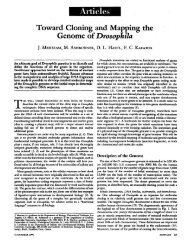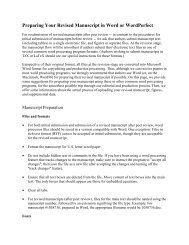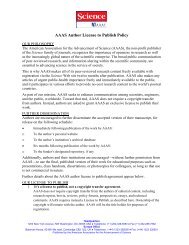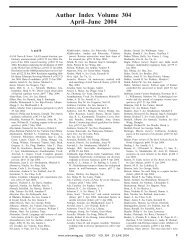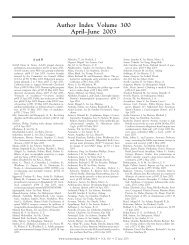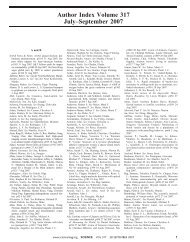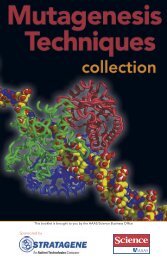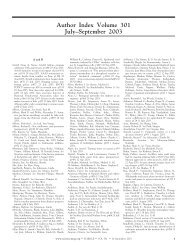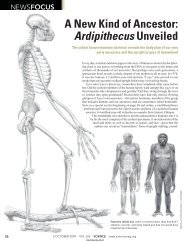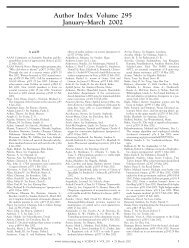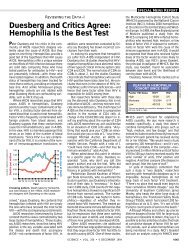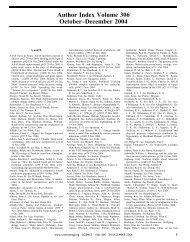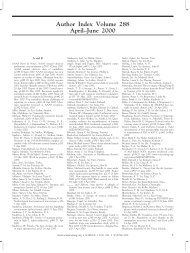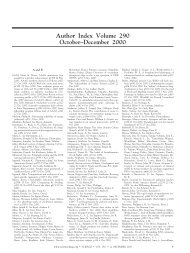Chinese Academy of Sciences (PDF) - low res version
Chinese Academy of Sciences (PDF) - low res version
Chinese Academy of Sciences (PDF) - low res version
You also want an ePaper? Increase the reach of your titles
YUMPU automatically turns print PDFs into web optimized ePapers that Google loves.
CREDIT: (TOP AND BOTTOM) COURTESY OF CAS;<br />
(MIDDLE) PHOTO BY WANG YONGJI<br />
Talent and Education CAS/In Focus<br />
innovation <strong>res</strong>earch activities in line with cutting-edge international science<br />
and technology by recruiting established <strong>res</strong>earchers who wish to work at<br />
CAS institutes on a full-time or short-term basis. The CAS Fel<strong>low</strong>ship for<br />
Young International Scientists enhances the cultural diversity and international<br />
quality <strong>of</strong> the <strong>res</strong>earch innovation teams by recruiting early-career<br />
<strong>res</strong>earchers and postdoctoral fel<strong>low</strong>s (under the age <strong>of</strong> 40) from foreign<br />
countries to work with CAS <strong>res</strong>earchers on a full-time basis for one to two<br />
years. The TWAS-CAS Fel<strong>low</strong>ship selects rising young to middle-aged scientists<br />
from developing countries to visit or study at CAS institutes for a<br />
maximum <strong>of</strong> 12 months in order to promote scientific development and<br />
enhance innovation capacity in developing countries (Figure 2).<br />
Einstein Pr<strong>of</strong>essorship Program<br />
The Einstein Pr<strong>of</strong>essorship Program, founded in 2004, is awarded each<br />
year to 20 distinguished international scientists actively working at the frontiers<br />
<strong>of</strong> science and technology, who make a short one to two week visit to<br />
China. The program is designed to strengthen scientific cooperation and<br />
exchange between CAS scientists, the Einstein Pr<strong>of</strong>essorship awardees,<br />
and their <strong>res</strong>pective laboratories, and in the long run, enhance the training<br />
<strong>of</strong> future generations <strong>of</strong> scientists in China.<br />
This program is open to scientists from around the world and in every scientific<br />
discipline. Einstein Pr<strong>of</strong>essors are expected to visit at least two CAS<br />
institutes in two different <strong>Chinese</strong> cities during their stay, and to carry out<br />
in-depth academic discussions with <strong>res</strong>earchers and graduate students at<br />
host institutes. Einstein Pr<strong>of</strong>essors are generally expected to deliver a lecture<br />
at one <strong>of</strong> the host institutes, the Graduate University <strong>of</strong> CAS (GUCAS)<br />
located in Beijing, or the University <strong>of</strong> Science and Technology <strong>of</strong> China<br />
(USTC) in Hefei. Each Einstein Pr<strong>of</strong>essor is expected to have one or two<br />
young CAS <strong>res</strong>earchers from the host institutes work in their laboratories<br />
for a period <strong>of</strong> one to three months (may be extended to up to six months),<br />
with all expenses for these <strong>res</strong>earchers covered by CAS.<br />
Thus far, 109 Einstein Pr<strong>of</strong>essorships have been awarded to scientists<br />
recognized as international leaders in their fields, including 16 Noble Laureates,<br />
three winners <strong>of</strong> the Turing Prize, two winners <strong>of</strong> the Wolf Prize, and<br />
one winner <strong>of</strong> the Tyler Prize for Environmental Achievement. These pr<strong>of</strong>essors<br />
have made significant contributions to the improvement <strong>of</strong> scientific<br />
innovation and training at CAS.<br />
JUNMA Program<br />
CAS and the Max Planck Society have extended their cooperation and<br />
shared inte<strong>res</strong>t in talent exchange through the JUNMA Program, a new<br />
initiative designed to recruit outstanding young <strong>res</strong>earchers from the Max<br />
Planck Institutes (MPIs) to continue their <strong>res</strong>earch at CAS. A memorandum<br />
<strong>of</strong> understanding was signed between CAS and MPG in June 2012<br />
and the program will launch later in the year. The JUNMA program aims to<br />
introduce excellent young scientists into CAS institutes. It works closely<br />
with the Recruitment Program <strong>of</strong> Foreign Experts <strong>of</strong> China, and applies a<br />
sequential career development model to nurture the most promising talent:<br />
Young <strong>res</strong>earchers are recruited from Young Scientist Research Group<br />
leaders after their MPI contracts end, or alternatively, young scientists with<br />
academic potential are jointly selected by CAS and MPG to work as Young<br />
Scientist Research Group leaders for a period <strong>of</strong> three to five years before<br />
going to CAS (Figure 3).<br />
The JUNMA Program <strong>of</strong>fers at least three years <strong>of</strong> funding, fully financed<br />
by CAS. Candidates receive a lump-sum personal al<strong>low</strong>ance <strong>of</strong> 1 million<br />
yuan (US$157,000), 3–5 million yuan (US$471,000–US$785,000) in<br />
<strong>res</strong>earch funding, as well as al<strong>low</strong>ances for medical insurance and pension<br />
costs. Both partner organizations agree to provide candidates with<br />
Figure 1. Summary <strong>of</strong> CAS fel<strong>low</strong>ships and cooperative programs<br />
for foreign talents.<br />
Figure 2. Pr<strong>of</strong>essor Bai Chunli (left), P<strong>res</strong>ident <strong>of</strong> CAS, meets<br />
with all foreign scientists working in CAS institutes in a special<br />
annual meeting.<br />
Figure 3. F<strong>low</strong>chart showing the selection procedure<br />
for the JUNMA Program.<br />
41



